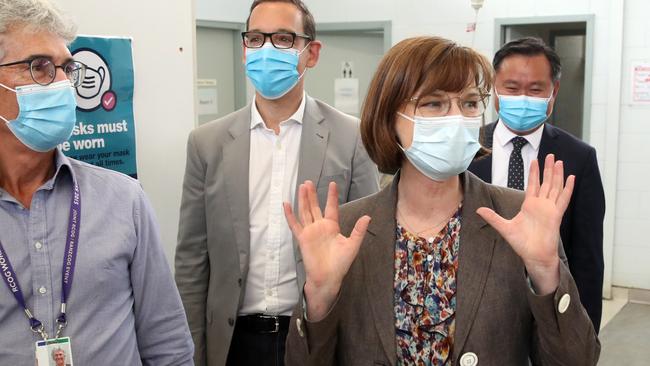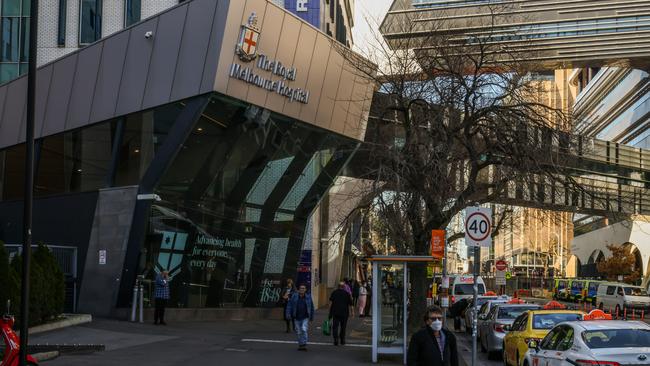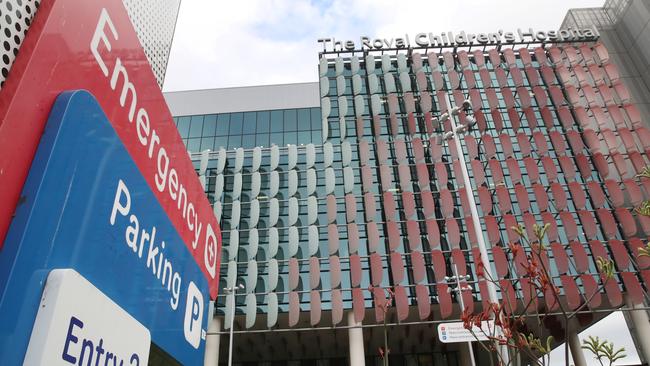Victoria’s latest Covid wave has peaked, health minister says
Victoria’s latest Covid wave has “peaked”, but that won’t offer an immediate reprieve to the state’s strained hospital system.
Victoria
Don't miss out on the headlines from Victoria. Followed categories will be added to My News.
Victoria’s latest Covid wave appears to have peaked and evened out, but Health Minister Mary-Anne Thomas has warned the hospital system will be strained over the next two weeks.
Speaking for the first time since being re-elected, Ms Thomas said she had received a briefing from the health department after being sworn in.
“Our latest data tells us that we’ve got around 550 (Covid) cases in hospital at the moment,” she said.
“The good news on Covid Is that the proportion of cases requiring hospitalisation has dramatically reduced in relation to the number of infections.
“The advice that I have is that we are plateauing and indeed, that we’ve peaked.”
But Ms Thomas said previous waves had taught them that there was a lag between positive cases and hospitalisations, which meant there would still be a strain on the system even as cases fell.
“The next two weeks are definitely going to continue to be challenging for our health care workers and indeed for all Victorians,” she said.
“It’s timely again, to ask Victorians to consider the ways in which they can take action to reduce the spread of Covid to protect their own health, that of their loved ones and the broader community.”
Ms Thomas said the health system and its workforce were under significant pressure during this latest wave.
She said one of the key issues to emerge from the pandemic was “deferred care” where people put off visiting health services until they were very sick.
“Pick up the phone, go and have a check-up (and) go and tackle those niggling problems,” she said.
“Don’t let them get worse.
“Because we’re all dealing with that in the health system at the moment. In our hospitals people are presenting sicker, they’re staying longer and that puts pressure on the system.”
Ms Thomas said staff furloughs were currently the most likely reason for surgeries being delayed by individual health services.
“This is really distressing and discomforting if you’re the person whose surgery is cancelled,” she said.
“But I want you to know that your health service will work with you to re-book you as quickly as possible.

“The most likely reason for your surgery being delayed at this point (is) that the people that were going to operate on you, that we’re going to care for you, have not been able to come to work.
“Clinicians are working very hard every day to actively manage the cases that are before them.”
When asked if she had received advice from the chief health officer about Covid measures, Ms Thomas said it would first depend on whether the premier activated pandemic powers again.
Victoria’s pandemic declaration expired in October and Daniel Andrews would need to make a new declaration to activate many of the health minister’s powers used to limit the spread of the virus such as density limits or wider mask requirements.
Ms Thomas said Victorians knew what to do to reduce infections after almost three years of the pandemic.
“We need to make sure that we stay vigilant,” she said.
“Donning a mask is a simple step that all Victorians can take in places where it’s not easy to stay socially distanced.
“Staying up to date with vaccines … making sure that you’ve spoken to your GP about a Covid plan. There’s so many steps that we can all take.
“If you are Covid positive, then I would ask that you stay home or at least stay away from other people so that you don’t spread the infection.”
New code orange alarm as health system squeezed
Ambulance Victoria called another code orange on Tuesday night, less than a week after they enacted a code red and warned Melburnians to expect ambulance delays.
An orange escalation is less serious than a code red, but is used when demand surges and signals to the wider health system paramedics are under pressure.
The code was called for the Melbourne metropolitan region about 10.30pm on Tuesday and remained throughout the night, with more than 120 ambulance staff off sick due to Covid.
An Ambulance Victoria spokeswoman said the “health system continues to experience ongoing demand and staff furlough issues” and urged community members to save triple-0 for emergencies.
The code is the latest of a string of measures used that signal the health system is under pressure, and is one of several code oranges called in recent weeks.
It follows news that several hospitals have had to cancel elective surgery, and comes less than a week after wide-sweeping policies were introduced across Victoria’s health system to manage demand, with hospitals given the power to cancel staff leave.

A spokeswoman for the Royal Melbourne Hospital said although they were conducting planned category one, urgent category two and some day surgeries they were facing high demand and “increasing levels of staff illness”.
“Unfortunately, due to these impacts, some patients may have their surgeries deferred,” she said.
“We are reviewing this daily and thank Victorians for their patience and support.”
It comes after The Alfred hospital announced on Monday they had paused all elective surgeries – expected to last for about one week – due to staff sickness, while the Royal Children’s Hospital has also delayed some operations.
The RCH battled “unprecedented demand” at their emergency department on Monday night, with families told to seek alternative care and – in non-urgent cases – waiting 12 hours.
While the situation had eased by Tuesday – with staff coming in on their day off – families still faced waits of up to five hours at times.
A Royal Children’s Hospital spokeswoman said there was “quite a lengthy wait for low acuity patients” and asked parents to try alternatives such as helpline Nurse on Call.
Up to half of the children who arrived on Monday had conditions that could be treated outside a hospital reigniting debate over primary care shortages.
The Royal Australian College of General Practitioners has repeatedly raised the alarm about the issue, stating at summit last month that the system was on the “brink of collapse”.
“GPs keep patients out of expensive and often distressing hospital care”, it stated.
“Australia is facing a shortage of GPs.”

A new Australian Institute of Health and Welfare report released on Wednesday showed Victoria had the largest increase in emergency department presentations nationwide in 2021-22 compared to the previous year.
One of the most damning figures was at Monash Medical Centre in Clayton where only 20 per cent of emergency patients began treatment within the recommended time frame, down from 93 per cent a decade ago.
The spike in demand for primary care has also been evident at after-hours telehealth service Kids Doc on Call, where calls have doubled in the past twelve days.
Founder Venus Behbhani Clark said the most common issues were asthma, respiratory, distress, vomiting, diarrhoea, skin rashes and fever, alongside “significantly high” levels of Covid.
“Small infants presenting with fevers and significant respiratory issues have been significantly higher than usual,” she said.
Australasian College of Emergency Medicine Victorian chair Dr Belinda Hibble said “complex and interconnected” issues drove Monday’s crisis, including a lack of skilled workforce, staffed hospital beds shortages and furlough linked to Covid and other illnesses.
She called for an increase in staffed hospital beds so more patients from the emergency department can be admitted; a 20 per increase in inpatient specialist and allied health support workers; better, centralised real-time data systems and more support for existing, burnt-out workers.
Health Minister Mark Butler said their new urgent care clinics will help reduce pressure on hospitals by supporting families “like those who were triaged as lower acuity”.




